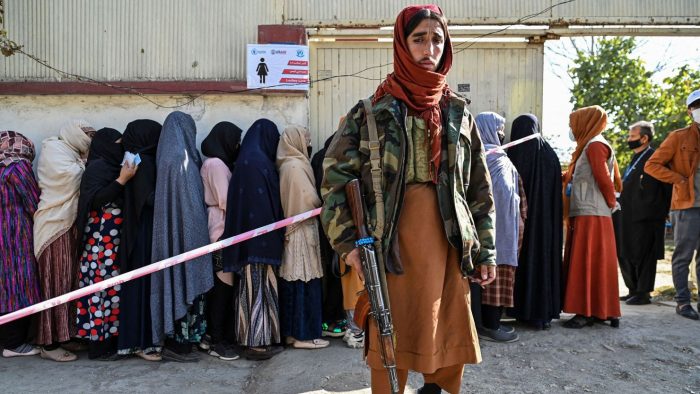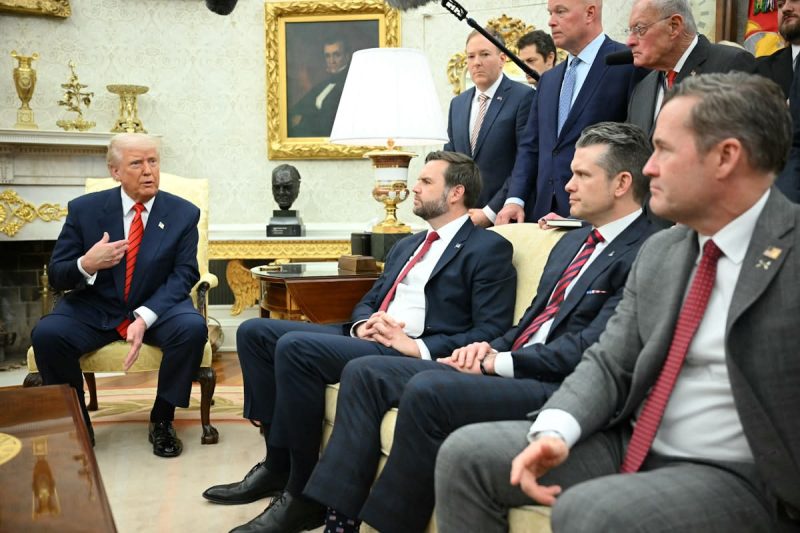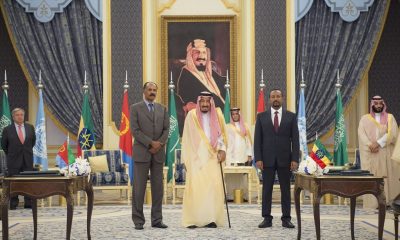Editor's Pick
UN Condemns Taliban’s New Morality Law as ‘Distressing Vision’ for Afghanistan

The United Nations Decries Taliban’s Latest Restrictions on Personal Freedom and Women’s Rights
The United Nations has denounced Afghanistan’s new morality law as a “distressing vision” for the country’s future. The UN’s criticism comes in response to the Taliban’s recently ratified Law on the Promotion of Virtue and the Prevention of Vice, which imposes severe restrictions on personal freedoms and exacerbates existing limitations on women’s rights.
Roza Otunbayeva, the head of the UN Assistance Mission in Afghanistan, expressed profound concern over the law’s implications. “It is a distressing vision for Afghanistan’s future, where moral inspectors have discretionary powers to threaten and detain anyone based on broad and sometimes vague lists of infractions,” she stated. The law, announced on August 14, enforces stringent measures including prohibiting women from singing, reciting poetry, or speaking aloud in public and mandating that they cover their faces and bodies at all times.
The 35-article law extends the Taliban’s already severe restrictions on Afghan women and girls. The new regulations align with previous measures that barred girls from continuing education beyond the sixth grade and significantly curtailed women’s employment and public participation.
The Ministry for the Propagation of Virtue and the Prevention of Vice will enforce the new regulations across Afghanistan, which continues to suffer from one of the worst humanitarian crises globally, exacerbated by prolonged conflict and natural disasters. The ministry’s powers include issuing warnings and imprisoning offenders for periods ranging from one hour to three days, with the possibility of property seizure as additional punishment.
Otunbayeva criticized the law for contributing to a climate of fear and oppression, emphasizing that the Afghan people, already burdened by decades of conflict and severe humanitarian needs, deserve better than to live under constant threat of detention for minor infractions. “After decades of war and in the midst of a terrible humanitarian crisis, the Afghan people deserve much better,” she said.
The UN mission is currently reviewing the law’s potential impact on Afghans and its implications for humanitarian assistance. The new law also hampers women’s participation in UN agencies and humanitarian organizations, further complicating relief efforts in the country.
The Taliban’s enforcement of Sharia law and strict hijab regulations has drawn international criticism. Mohammad Khaled Hanafi, head of the Taliban’s Vice and Virtue Ministry, defended the law, labeling it a non-negotiable “red line” for the regime. He urged religious scholars to counter Western criticism and asserted that the Taliban is committed to granting women their rights under Sharia law.
Human rights advocates and media freedom organizations have expressed alarm over the law’s provisions that restrict press freedom. The Committee to Protect Journalists (CPJ) condemned the law as a severe blow to Afghanistan’s already fragile media landscape. “The Law for the Propagation of Virtue and the Prevention of Vice grants the Taliban’s notorious morality police extensive powers to further restrict Afghanistan’s already decimated media community,” said Beh Lih Yi, CPJ Asia program coordinator.
The UN’s repeated warnings about the Taliban’s sweeping restrictions on women and girls continue to impede international recognition of the Taliban regime. Last week, the Taliban further strained relations with the international community by banning Richard Bennett, the UN-appointed special rapporteur on Afghan human rights, from visiting the country. The Taliban accused Bennett of spreading “misleading” information about Afghanistan’s situation.
The new morality law underscores the deepening crisis in Afghanistan and highlights the growing chasm between the Taliban’s governance and international expectations for human rights and personal freedoms.
Analysis
Signal Leak Sends Shockwaves Through Trump’s Security Team

Signal Leak Sends Shockwaves Through Trump’s Security Team.

JD Vance, Pete Hegseth, Tulsi Gabbard — all named in a leaked Signal thread about Yemen strikes. What started as a tech blunder may trigger the first cabinet shake-up of Trump’s second term.
The accidental inclusion of a journalist in a top-secret group chat has sent national security adviser Mike Waltz’s future into turmoil — and reignited internal fights over foreign policy, loyalty, and legacy in Donald Trump’s new White House.
The fallout from the Signal leak — in which Atlantic editor-in-chief Jeffrey Goldberg was mistakenly looped into a thread discussing imminent strikes on Houthi targets — has consumed the West Wing. What was already shaping up to be a high-stakes week for the administration has now turned into a full-blown crisis.
How Did This Happen?
On March 11, Goldberg received an invite to join Signal from “Mike Waltz.” That alone raised eyebrows. But what came next sparked panic: Goldberg was added to a private group labeled “Houthi PC small group,” where top officials like Defense Secretary Pete Hegseth, Vice President JD Vance, and DNI Tulsi Gabbard were exchanging operational details and policy concerns.
According to insiders, Goldberg didn’t say a word — he quietly observed and later reported the exchange, igniting what may become the first major national security scandal of Trump’s second term.
The Fallout: Recklessness or Setup?

Some White House staffers want Waltz out — now. “It was reckless not to check who was on the thread,” said one senior official. “You can’t have recklessness as the national security adviser.” Others say this was no accident but rather the latest ammunition for internal rivals long suspicious of Waltz’s neocon past.
And while Trump has not pulled the trigger, the White House is clearly rattled. Text chains among aides are buzzing. “Half of them saying he’s never going to survive or shouldn’t survive,” one source admitted.
The blunder also opened a new line of attack from “America First” isolationists, who have never trusted Waltz’s credentials — particularly his past ties to Dick Cheney and the Bush-era counterterror playbook. His relationship with Goldberg, in their eyes, is proof of where his true loyalties lie.
Trump’s Move: Loyalty or Leverage?
So far, Trump is standing by his man. “President Trump continues to have the utmost confidence in his national security team,” said press secretary Karoline Leavitt.
But that confidence may be conditional. The president is known for letting public narrative shape private personnel decisions. Should Fox News turn sour, or Trump see too many headlines with “Waltz” and “leak” in the same sentence, that support could evaporate fast.
And there are whispers that this blunder may provide Trump with an opening — a chance to appease isolationists in his base by ousting someone perceived as too hawkish, too Beltway, too old guard.
Vance, Hegseth, Gabbard… Who Else Is in Trouble?
The leak also dragged in other high-profile officials. JD Vance’s remarks — advocating for a delayed strike to avoid economic blowback — were widely seen as undermining Trump’s hardline stance. Some speculate that Trump might be more furious at Vance than Waltz. Or perhaps at Hegseth, allegedly the one who shared strike details in the first place.
One aide put it bluntly: “This could turn into a loyalty test.”
The ultimate decision — to fire or forgive — will come down to Trump’s read on who embarrassed him, who is expendable, and who can be useful moving forward.
Commentary
President Irro Launches Major Road, Military Projects During Sahil Region Visit

President Irro’s regional tour signals firm commitment to infrastructure, military modernization, and grassroots development.

President Abdirahman Mohamed Abdullahi (Irro)’s official visit to the Sahil region marks a significant moment in Somaliland’s ongoing nation-building efforts. With high-profile stops across key towns and the launch of infrastructure and security initiatives, the visit showcased a practical governance approach grounded in visible development and direct engagement with communities.
At the center of this trip was the formal inauguration of the reconstructed Berbera–Sheikh Road, a vital economic artery connecting coastal and inland regions.

By reopening this strategic route—now fortified with twenty modernized bridges—the Irro administration sends a clear message: Somaliland is investing in long-term connectivity to unlock internal trade and enhance regional cohesion. Roads are more than infrastructure—they’re lifelines for commerce, mobility, and national unity.
Equally important was the launch of the first Civil Defense Forces training program at the Abdullahi Feedhe Military Training School in Sheikh.

This move signals a deeper prioritization of national defense, particularly in the context of Somaliland’s quest for recognition and self-reliance. Irro’s focus on security modernization—combined with laying the foundation for new military facilities—reflects a broader vision to professionalize the armed forces and build public confidence in national institutions.
The President’s remarks throughout the visit were strategic and symbolic. His emphasis on linking infrastructure with national development, and the praise he offered to both engineers and new recruits, positions him as both a developmental leader and a unifier. Engaging directly with traditional elders, local leaders, and residents further reinforced the government’s focus on community inclusion and decentralized progress.

This tour is also a signal to both domestic and international audiences. Internally, it demonstrates Irro’s intent to govern through performance-based legitimacy and regional outreach. Externally, it offers a glimpse into Somaliland’s stable governance model—where development, security, and civic engagement are not mere slogans but operational priorities.
Ultimately, the visit reflects a political philosophy grounded in delivering results, building state capacity, and consolidating Somaliland’s independent identity. While recognition remains elusive on the global stage, the government’s continued push for infrastructure, institutional reform, and strategic military readiness reflects a de facto state acting with intention—and with ambition.
Analysis
U.S. Target Chinese Students Over Espionage Fears, Sparking Diplomatic Backlash

Congressional panel demands data from universities as Beijing warns against violating rights of Chinese nationals studying in the U.S.
Tensions between Washington and Beijing have flared again, this time over Chinese students studying at U.S. universities. A congressional panel led by the House Select Committee on the Chinese Communist Party has formally requested data from six leading American institutions—Carnegie Mellon, Stanford, Purdue, USC, and others—regarding Chinese nationals in STEM fields. The panel alleges that these students may be embedded by Beijing to illicitly access sensitive research and advanced technologies.
The request, issued by committee chair Rep. John Moolenaar, reflects a growing wave of suspicion in Washington about the role of foreign students in U.S. research infrastructure. He described the current environment as a “dangerous crossroads,” where financial dependence on international tuition may be compromising national security. He further warned that academic campuses serve as “soft targets” for espionage, with the student visa system acting as a “Trojan Horse for Beijing.”
The accusations, while not new, signal an intensifying political push to scrutinize Chinese students and researchers more broadly. Lawmakers argue that Chinese nationals in U.S. programs tied to cutting-edge innovation—particularly in artificial intelligence, semiconductors, aerospace, and quantum computing—may be exploited by Beijing for strategic advantage.
Requests from the committee include data on research topics, funding sources, and institutional safeguards to prevent unauthorized access to federally funded projects. The implication is clear: lawmakers believe U.S. universities may be unwittingly contributing to China’s technological rise, particularly in areas with dual-use military potential.
However, this hardline stance has sparked significant backlash. Critics argue that sweeping generalizations about Chinese students risk veering into racial profiling and could undermine the very scientific openness that drives American innovation. Universities rely heavily on international students, especially from China, both for tuition and for their contributions to research and development.
Beijing was quick to condemn the move. Chinese Foreign Ministry spokesperson Mao Ning urged the U.S. to “stop overstretching the concept of national security” and to uphold the rights of Chinese students abroad. She emphasized that Chinese nationals make up roughly 25% of the international student population in the U.S. and contribute meaningfully to economic and technological advancement.
The latest controversy arrives amid an already fragile U.S.-China relationship, with disputes ranging from trade and technology to military posture in the Indo-Pacific. Beijing views the escalating rhetoric against its students as part of a broader campaign to contain China’s rise by restricting access to knowledge and collaboration.
Adding fuel to the fire, Republican Rep. Riley Moore introduced the “Stop CCP Visas Act”, which proposes banning Chinese citizens from studying or participating in exchange programs in the U.S. While the bill is unlikely to pass, it has generated alarm among civil rights groups and educators, who draw parallels to the Chinese Exclusion Act of 1882—a now-defunct law that restricted Chinese immigration for over 60 years.
The proposal has been met with strong resistance, not only from Democrats but also from within the higher education sector, which warns of long-term harm to America’s reputation as a global hub for academic excellence.
This clash over Chinese students encapsulates a broader dilemma in U.S.-China relations: how to safeguard national security without undermining openness and academic collaboration. While lawmakers raise valid concerns about espionage and intellectual property theft, targeting students en masse risks harming diplomatic relations, educational institutions, and America’s own innovation ecosystem.
At a time when global collaboration is vital to address challenges from climate change to pandemics, narrowing educational channels may prove counterproductive. How Washington navigates this balance will shape not only its scientific leadership but also the character of its global partnerships.
Editor's Pick
Strategic Diplomatic Appointments: Ruto Positions Kenya for Global Influence

President William Ruto of Kenya has made a significant reshuffle in the government’s principal secretaries and diplomatic positions, aiming to bolster the country’s focus on emerging economic sectors and enhance the implementation of its economic strategies. This strategic move is part of Ruto’s effort to drive the administration’s Seminal Social Economic Blueprint and Bottom Up Transformation agenda.
Key Changes and Appointments
Susan Nakhumicha, former Health Cabinet Secretary, is nominated as the Permanent Representative to the UN-Habitat, marking a significant appointment that places a seasoned government official in a pivotal international role.
Dr. Jane Kare Imbunya is nominated as Principal Secretary for the State Department for Public Service & Human Capital Development, highlighting the administration’s focus on enhancing public service efficiency and human capital.
Ms. Regina Akoth Ombam and Mr. Cyrell Wagunda Odede are nominated for crucial economic roles, which underscores the government’s emphasis on trade and investment, crucial for Kenya’s economic expansion and integration into global markets.
Foreign Service Nominations
James Buyekane Muhati as Consul-General in Guangzhou, China, and Abdi Dubat Fidhow as Consul-General in Arusha, Tanzania, reflect Kenya’s strategic interest in strengthening ties with these regions, vital for economic and diplomatic relations.
Peter Tum, former Sports Principal Secretary, nominated as Ambassador to the Democratic Republic of Congo, indicates a strategic diplomatic engagement with a neighboring country critical for regional stability and cooperation.
The reshuffle is intended to optimize the government’s alignment with President Ruto’s development agenda, particularly focusing on economic growth, regional cooperation, and efficient public service delivery. The appointments are also strategically placed to enhance Kenya’s diplomatic presence and influence in international and regional affairs.
This administrative overhaul could potentially lead to more streamlined governance and effective implementation of government policies, especially in key sectors like trade, health, and regional development. However, the success of these changes will depend heavily on the cooperation between new appointees and existing structures, as well as their ability to adapt to and manage the challenges of their respective roles. The move also signals a potential shift in policy direction, which could have long-term implications for Kenya’s socio-economic trajectory and its interaction on the international stage.
Editor's Pick
Ifrah Ahmed: The Culinary Historian Reimagining Somali Cuisine on the World Stage

From New York to Seattle, Chef Ifrah Ahmed blends tradition with innovation to preserve Somali culinary heritage through pop-ups and a forthcoming cookbook.
Ifrah F. Ahmed is making significant strides in preserving and celebrating Somali cuisine through her unique culinary ventures and literary efforts. Based between New York and Seattle, Ahmed is not only a chef but a cultural historian, dedicating her career to safeguarding the traditions of Somali food culture. Her journey intertwines the flavors of her heritage with the global palate, emphasizing the importance of oral traditions in the transmission of Somali culinary practices.
Ahmed’s initiative, Milk and Myrrh, is a series of pop-up events that offer a deep dive into the essence of Somali cuisine. These gatherings are more than just meals; they are an educational experience that invites attendees to explore Somali food through a lens that blends historical narratives with culinary innovation. Her pop-ups have graced various cities including Los Angeles, Seattle, and Brooklyn, each location highlighting different aspects of Somali food influenced by local ingredients and culinary trends.
In Los Angeles, Ahmed focuses on plant-forward dishes that resonate with the city’s health-conscious trends, while in Seattle, the rich local seafood plays a starring role. One of her notable creations is the Somali-style breakfast burrito in Los Angeles, an inventive fusion that marries the traditional Somali anjero (a pancake-like bread) with the popular Western breakfast format.
Apart from her pop-up experiences, Ahmed’s contributions to food literature are profound. A regular contributor to The New York Times Cooking section, she uses her platform to advocate for the representation of Somali and broader Muslim cuisines in the mainstream culinary world. Her writings reflect a blend of culinary artistry and literary skill, aiming to educate her readers about the rich tapestry of flavors that Somali food has to offer while highlighting the cultural narratives embedded in each dish.
The challenge of transforming oral recipes into written records is a significant aspect of her work. Ahmed collaborates with linguists and historians to transcribe these recipes, ensuring their preservation. This task is akin to being a detective, as she pieces together fragmented culinary heritage to share with the world. Her efforts are not just about recording recipes but about documenting the journey of Somali cuisine through the ages and across continents, particularly reflecting the impact of migration on the culinary practices of the Somali diaspora.
Ahmed is currently working on her first cookbook, which promises to be a significant addition to the culinary world. This book plans to explore the influence of forced migration on Somali cuisine, featuring stories and recipes that highlight the adaptability and resilience of Somali food traditions. Through her cookbook, Ahmed aims to connect readers with the narrative of Somali cuisine, enriched by contributions from Somali culinary professionals worldwide.
Her work is a beacon for cultural preservation through cuisine, serving as an inspiration for anyone looking to explore their culinary heritage. Ahmed’s journey is a testament to the power of food as a medium for cultural expression and preservation, making her a pivotal figure in the culinary world.
Editor's Pick
UAE’s High-Tech Gambit in Somaliland

Exploring the UAE’s strategic investment in a major server facility in Berbera, Somaliland, aiming to skirt U.S. tech restrictions and reshape regional power dynamics.
How Somaliland’s quest for recognition is intertwined with global tech and geopolitical strategies, positioning it as a pivotal player in the Horn of Africa.
The intricate dance of geopolitics and technological ambitions is unfolding dramatically on the shores of Berbera, Somaliland, drawing the gaze of global powers and setting the stage for potential shifts in regional dynamics. The United Arab Emirates, leveraging its partnership with American tech giant Microsoft and its AI subsidiary G42, is spearheading the construction of a significant data center in Berbera. This move not only aims to skirt the tightening U.S. restrictions on chip exports but also signals a deeper geopolitical play.
Somaliland, sovereign state yet unrecognized by the international community, finds itself at the crossroads of a strategic gambit involving key global players. The UAE’s investment in Berbera goes beyond economic interests, serving as a geopolitical lever to enhance its standing in the Horn of Africa and as a counterbalance to Chinese influence in the region. This is evidenced by the UAE’s calculated navigation of U.S. regulations, which have recently been tightened, restricting the export of advanced processors as part of a broader strategy to curb China’s technological and military advancements.
The U.S. administration, under President Trump, has categorized the UAE under a “second-tier” designation, limiting its access to critical technology based on security commitments and regional alignments. This categorization is part of a broader U.S. strategy to maintain technological supremacy and control over its geopolitical rivals, particularly China. The U.S. concerns about the UAE’s ties with China underline the complex interplay of alliance and competition that defines current international relations.
President Trump’s impending visit to Saudi Arabia is poised to further complicate the regional geopolitical tapestry. High on the agenda are the potential recognition of Somaliland, which would not only alter the strategic landscape of the Horn of Africa but also bolster Saudi Arabia’s influence in the region. Moreover, discussions are likely to extend to the Ben Gurion Canal, a project that promises to reshape global trade routes and reduce dependency on the Suez Canal, thereby realigning geopolitical loyalties and economic dependencies.
The UAE’s maneuvering in Berbera, supported by American corporate technology and entwined with broader U.S. strategic interests, highlights a pivotal moment in African geopolitics. Somaliland’s push for recognition, supported by technological and infrastructure investments, could redefine its international standing and reshape regional power dynamics.
The interplay of U.S. policy, Emirati investments, and regional aspirations underscores the multifaceted nature of modern geopolitics, where technology, trade, and strategic military interests converge, heralding a new era of competition and cooperation on the African continent and beyond.
Editor's Pick
Mysterious Illness Strikes Puntland: Rapid Outbreak Claims Lives in Karkaar Region

Deadly Unknown Virus in Rako Raaxo District Triggers Alarm and Urgent Health Response.
A perplexing and lethal illness has emerged in the Rako Raaxo District of Puntland’s Karkaar Region, causing immediate concern among local health authorities and the community. The sudden outbreak has already resulted in the deaths of four individuals and has left many more hospitalized, presenting symptoms that mystify medical professionals.
The unknown disease manifests with severe symptoms, including a high fever, cough, and more alarmingly, hemorrhagic signs such as bleeding from the nose and mouth. Additionally, affected individuals report a loss of smell and taste, along with a disconcerting symptom described as bone loss, which could suggest a severe systemic impact of the infection.
Abdirashid Omar Said, the governor of Rako Raaxo District, has confirmed these disturbing developments. In response to the crisis, local health authorities have launched awareness campaigns and established specialized centers to manage and isolate the afflicted, attempting to curb the spread of this mysterious disease. However, the rural setting and limited medical infrastructure pose significant challenges to effective disease management and containment.
As the medical community scrambles to identify the pathogen, there is growing concern about the potential for this unknown illness to spread beyond the immediate region. Samples have likely been sent to more equipped facilities for analysis, but as of now, the causative agent remains a mystery, complicating efforts to treat and prevent further infections.
This outbreak is a stark reminder of the vulnerabilities faced by remote regions in dealing with emergent health crises. The situation in Rako Raaxo underscores the critical need for robust health systems and rapid response mechanisms in rural areas, particularly in regions recovering from or susceptible to conflicts and natural disasters.
The unfolding situation in Puntland demands urgent attention from national health authorities and international health organizations. Collaborative efforts will be crucial in diagnosing the disease, treating the affected population, and preventing further casualties. As the world has learned from past epidemics, early intervention and transparent communication are key to managing health crises effectively.
The community, while anxious, remains hopeful as efforts to understand and combat the mysterious illness continue. The resilience of Rako Raaxo’s residents and the dedicated response from healthcare workers provide some reassurance that the outbreak can be contained and overcome.
Editor's Pick
Women’s Rights Advocates Warn UN to Confront Backlash Against Progress

As the world observes International Women’s Day, women’s rights advocates confront a global trend of regressing freedoms, emphasizing the urgent need for sustained action at the United Nations.
During a poignant session at the United Nations on International Women’s Day, women’s rights advocates voiced grave concerns over the global backslide in gender equality. This gathering, marked by powerful declarations from leaders like Sima Bahous, executive director of U.N. Women, and U.N. Secretary-General Antonio Guterres, underscored the vital need for a renewed commitment to women’s rights as human rights—a principle firmly established at the landmark Beijing conference 30 years ago.
The session highlighted not just the achievements in women’s rights but the severe and escalating challenges women face worldwide. These include encroachments on reproductive rights, persistent gaps in education and economic opportunities, and widespread violence and discrimination. This year’s International Women’s Day served as a crucial reminder of the robust efforts required to counter these setbacks and to propel forward the agenda set in Beijing.
Guterres’s speech emphasized the stark reality of gender disparities, noting that at the current rate, it would take 130 years to eradicate extreme poverty among women and girls. His message was clear: gender equality is fundamentally about power, and the struggle continues to ensure women have equal access to this power, symbolized by their presence at decision-making tables worldwide.
Jaha Dukureh, a U.N. goodwill ambassador for Africa and a survivor of female genital mutilation (FGM) and child marriage, added a deeply personal and powerful narrative to the discourse. Her call to action for governments to invest in women and girls’ social protection and education highlighted the direct link between economic independence and personal freedom.
The upcoming Commission on the Status of Women (CSW) meeting at the U.N. headquarters will further this dialogue, focusing on promoting gender equality and empowering women. However, the challenges are formidable. Sarah Hendriks, director of policy for U.N. Women, pointed out the increasingly well-funded and coordinated efforts by anti-women’s rights groups that threaten to undermine legal and policy gains. This year’s CSW is not just a routine gathering but a battlefield where the future direction of women’s rights will be contested.
The anticipated political declaration from the CSW, while a potential tool for progress, faces contentious negotiations, especially concerning reproductive rights. The outcome of these discussions will be a significant indicator of the international community’s resolve to defend and advance women’s rights.
In conclusion, the events at the U.N. around International Women’s Day reveal a critical juncture in the fight for gender equality. As advocates rally against a global backlash, the world must pay heed to these voices calling for justice and equality. The resolve shown at the U.N. must translate into concrete actions that uphold and advance the rights of women across the globe, ensuring that the gains of the past are not eroded but rather built upon for a more equitable future.
-

 Analysis2 weeks ago
Analysis2 weeks agoSaudi Arabia’s Billion-Dollar Bid for Eritrea’s Assab Port
-

 Somaliland2 months ago
Somaliland2 months agoSomaliland and UAE Elevate Ties to Comprehensive Strategic Partnership
-

 Africa12 months ago
Africa12 months agoHow Somaliland Could Lead the Global Camel Milk Industry
-

 Analysis12 months ago
Analysis12 months agoIran escalates conflict, attacking Israel; US forces help Israel to intercept Iranian projectiles
-

 Top stories10 months ago
Top stories10 months agoGunmen Kill 11 in Southeastern Nigeria Attack, Army Reports
-

 Analysis11 months ago
Analysis11 months agoIsrael and Iran on Edge: Tensions Escalate Amidst Rising Threats
-

 TECH10 months ago
TECH10 months agoZimbabwe Approves Licensing of Musk’s Starlink Internet Service
-

 Analysis11 months ago
Analysis11 months agoFacts in the Trump Courtroom vs. ‘Facts’ in the Court of Public Opinion






























